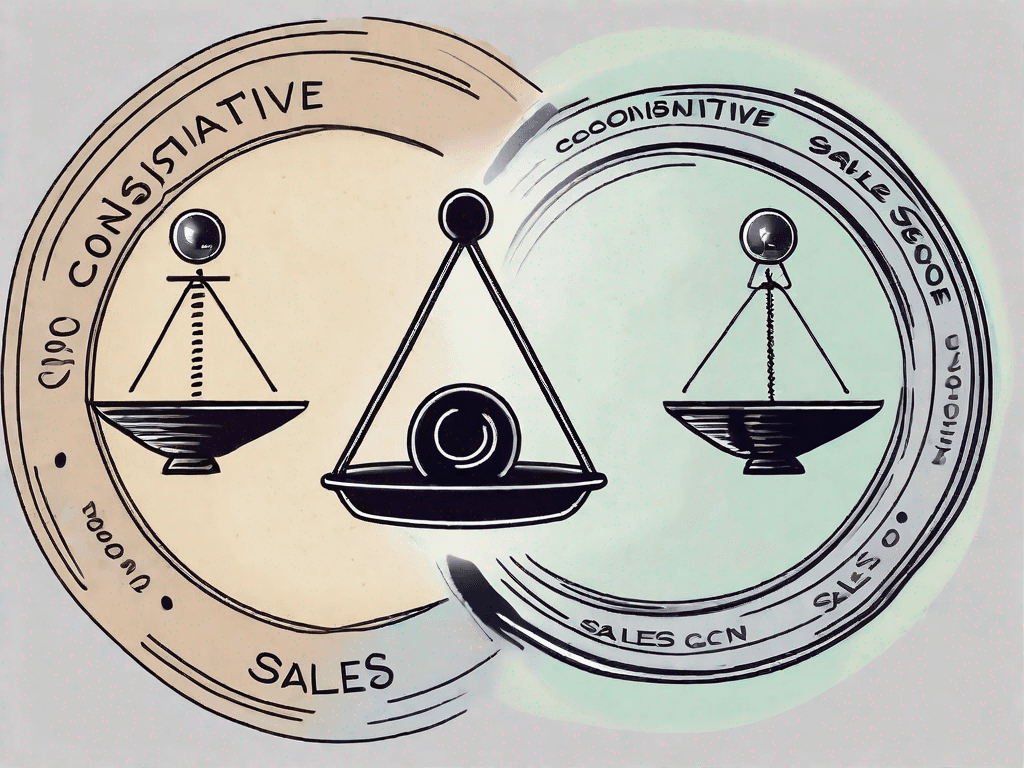
Sales Coach vs Sales Mentor: What's the Difference?
The world of sales is full of various roles and titles, each with its own unique responsibilities and qualities. Two common roles that are often discussed are sales coach and sales mentor. Many people use these terms interchangeably, but they actually have distinct differences. In this article, we will explore the definitions of a sales coach and a sales mentor, discuss the differences between the two, and provide examples to illustrate their distinctions
Defining Sales Coach and Sales Mentor
1.1 - What is a Sales Coach?
A sales coach is an individual who provides guidance, support, and training to sales professionals to improve their skills and achieve their sales targets. They focus on specific aspects of sales techniques, such as prospecting, negotiating, and closing deals. Sales coaches tailor their approach to the individual needs of the salesperson and often use coaching methodologies and strategies to drive growth.
Let's dive deeper into the role of a sales coach. Sales coaches are not just experts in sales techniques; they are also skilled at understanding the unique challenges faced by sales professionals. They have a keen eye for identifying areas of improvement and developing personalized strategies to address them.
One of the key responsibilities of a sales coach is to provide guidance on prospecting. They help sales professionals identify potential customers, develop effective prospecting strategies, and improve their ability to generate leads. Through targeted coaching sessions, sales coaches teach salespeople how to approach prospects, build rapport, and create meaningful connections that can lead to successful sales conversions.
Another crucial aspect of a sales coach's role is to enhance negotiating skills. They work closely with sales professionals to develop effective negotiation techniques, such as understanding the needs and motivations of the customer, identifying common ground, and presenting compelling arguments. Sales coaches provide valuable feedback and guidance during role-playing exercises to help salespeople refine their negotiation skills and increase their chances of closing deals.
Closing deals is often the ultimate goal for sales professionals, and sales coaches play a vital role in helping them achieve this. They provide guidance on effective closing techniques, such as creating a sense of urgency, addressing objections, and presenting compelling value propositions. Sales coaches also help salespeople develop strategies to overcome common obstacles that may arise during the closing process, ensuring a higher success rate.
Overall, a sales coach is a valuable asset to any sales team. They bring a wealth of knowledge, experience, and expertise to the table, helping sales professionals reach their full potential and achieve their sales targets.
1.2 - What is a Sales Mentor?
In contrast, a sales mentor is an experienced sales professional who takes on a more holistic approach to development. They act as a trusted advisor and role model to less experienced salespeople, sharing their industry knowledge and personal experiences to help mentees grow both professionally and personally. Sales mentors often guide mentees in navigating various challenges, such as career advancement and work-life balance.
Let's explore the role of a sales mentor in more detail. Sales mentors are not just focused on improving specific sales techniques; they are invested in the overall growth and development of their mentees. They provide support, guidance, and encouragement to help sales professionals excel in their careers.
One of the primary responsibilities of a sales mentor is to share their industry knowledge and personal experiences. They offer valuable insights into the sales profession, including market trends, customer behavior, and effective sales strategies. By drawing on their own successes and failures, sales mentors provide real-world examples that can help mentees navigate various sales scenarios with confidence.
In addition to sales-related guidance, sales mentors also play a crucial role in helping mentees develop essential professional skills. They provide advice on effective communication, time management, and goal setting. Sales mentors help mentees identify their strengths and weaknesses, and work with them to create personalized development plans that align with their career aspirations.
Furthermore, sales mentors offer guidance on career advancement. They help mentees identify potential growth opportunities within the sales field, provide insights on how to position themselves for promotions, and offer advice on building a strong professional network. Sales mentors also assist mentees in setting long-term career goals and developing strategies to achieve them.
Work-life balance is another area where sales mentors provide valuable support. They understand the demands and challenges of a sales career and help mentees find ways to maintain a healthy work-life balance. Sales mentors share strategies for managing stress, setting boundaries, and prioritizing personal well-being, ensuring that mentees can thrive both professionally and personally.
In conclusion, a sales mentor is not just a source of sales-related guidance; they are a trusted advisor who supports the overall growth and development of their mentees. Through their industry knowledge, personal experiences, and mentorship, sales mentors empower sales professionals to reach new heights in their careers.
What's the difference between a Sales Coach and a Sales Mentor?
Now that we have established the definitions of sales coach and sales mentor, let's delve into their differences.
A key distinction lies in their primary focus. A sales coach primarily concentrates on improving specific sales skills and achieving immediate sales results, whereas a sales mentor focuses on the overall development and long-term success of the mentee.
Additionally, while a sales coach typically works with individuals or teams for a defined period, a sales mentor often forms ongoing relationships with their mentees, providing guidance and support throughout their careers.
Another aspect that sets these roles apart is the level of experience. Sales coaches are often seasoned professionals with extensive knowledge and expertise in sales techniques, whereas sales mentors are more experienced professionals who have successfully navigated their careers, building a wealth of industry-specific wisdom and insights.
Examples of the Difference between a Sales Coach and a Sales Mentor
2.1 - Example in a Startup Context
Imagine a startup that has recently hired a sales team. The sales coach would focus on training the new hires in sales methodologies, providing feedback on their performance, and helping them refine their prospecting techniques. On the other hand, the sales mentor would share their experiences in navigating the challenges of working in a startup environment, offering guidance on building relationships with key stakeholders and providing advice on long-term career growth within the company.
2.2 - Example in a Consulting Context
In a consulting firm, a sales coach might work closely with consultants to improve their presentation skills and develop persuasive arguments. They would provide practical tips on structuring a proposal and handle objections from clients. In contrast, a sales mentor in the same context would share their experiences in winning high-stakes consulting projects, offering insights into effective client relationship management, and helping the mentee foster long-term client partnerships.
2.3 - Example in a Digital Marketing Agency Context
In a digital marketing agency, a sales coach may focus on honing the skills of the sales team in creating compelling digital marketing strategies to attract clients. They would provide training on emerging trends and tools to optimize campaign performance. Conversely, a sales mentor in this scenario would guide the mentee in building a personal brand within the industry, offering advice on thought leadership initiatives and networking strategies to establish a strong professional reputation.
2.4 - Example with Analogies
Imagine sales as a race. The sales coach would be the trainer who focuses on improving the technique, speed, and endurance of the racers. They break down the race into specific segments, offering guidance on each part. On the other hand, the sales mentor would be the experienced marathon runner who shares their journey, strategies, and mindset to inspire and guide the mentees through the ups and downs of the race, helping them develop the resilience necessary to thrive in the long run.
As illustrated by these examples, the differences between a sales coach and a sales mentor are evident. It is essential to understand these distinctions to determine the most suitable approach when seeking guidance and development in the sales profession.
In conclusion, while a sales coach focuses on improving specific sales skills to drive immediate results, a sales mentor takes a broader approach, aiming to foster overall development and long-term success. Both roles are valuable in the sales industry, and understanding their differences can help individuals identify which form of guidance aligns best with their needs and goals.


















































































































































